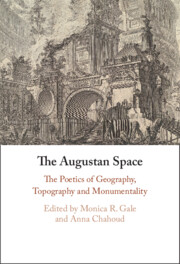Book contents
- The Augustan Space
- The Augustan Space
- Copyright page
- Contents
- Notes on Contributors
- Preface
- Abbreviations
- Introduction
- Chapter 1 The City in Horace’s sermo
- Chapter 2 excucurristi a Neapoli
- Chapter 3 Poetic and Imperial Spaces in Propertius, Books 1–3
- Chapter 4 Horace on Sacred Space
- Chapter 5 Roman Topography, Politics and Gender
- Chapter 6 aurea nunc, olim siluestribus horrida dumis
- Chapter 7 Hippolytus and Egeria in the Woods of Aricia (Virgil, Aen. 7.761–82 and Ovid, Met. 15.479–551)
- Chapter 8 locum tua tempora poscunt
- Chapter 9 imperii Roma deumque locus
- Chapter 10 The Rise and Fall of Virgil’s Sublime Carthage
- Chapter 11 Eccentric Poetry
- Chapter 12 Virgilian Heterotopias
- Chapter 13 loci desperati
- Works Cited
- Index Locorum
- General Index
Chapter 1 - The City in Horace’s sermo
Physical Spaces and Political Spaces
Published online by Cambridge University Press: 14 June 2024
- The Augustan Space
- The Augustan Space
- Copyright page
- Contents
- Notes on Contributors
- Preface
- Abbreviations
- Introduction
- Chapter 1 The City in Horace’s sermo
- Chapter 2 excucurristi a Neapoli
- Chapter 3 Poetic and Imperial Spaces in Propertius, Books 1–3
- Chapter 4 Horace on Sacred Space
- Chapter 5 Roman Topography, Politics and Gender
- Chapter 6 aurea nunc, olim siluestribus horrida dumis
- Chapter 7 Hippolytus and Egeria in the Woods of Aricia (Virgil, Aen. 7.761–82 and Ovid, Met. 15.479–551)
- Chapter 8 locum tua tempora poscunt
- Chapter 9 imperii Roma deumque locus
- Chapter 10 The Rise and Fall of Virgil’s Sublime Carthage
- Chapter 11 Eccentric Poetry
- Chapter 12 Virgilian Heterotopias
- Chapter 13 loci desperati
- Works Cited
- Index Locorum
- General Index
Summary
In Satire 1.6, Horace depicts himself as a private citizen free to move around as he wishes in opposition to another character who does not enjoy such freedom of movement, owing to the fact that he is a politician. Seneca, in De clementia (perhaps recalling Horace), extols the freedom of movement he enjoys in the urban space thanks to the emperor, who, on the contrary, complains about the limitations imposed on him by his role. In Xenophon, Hiero, who was a private citizen before becoming a tyrant, is questioned by Simonides about the joys and woes of the two conditions: private citizens can go anywhere, while for tyrants everywhere they go is like travelling in enemy territory. In Horace’s sermo, the concrete space of the city refers to a potentially open political space: the figures we see moving around the streets of Rome are free to choose between political abstention and participation on the basis of their own personal inclinations. But the political and social situation was uncertain and unstable. Situations and characters tend in fact to transcend their immediate concreteness, referring to something else as well: something suited to satisfying the search for a principle of authority.
- Type
- Chapter
- Information
- The Augustan SpaceThe Poetics of Geography, Topography and Monumentality, pp. 23 - 40Publisher: Cambridge University PressPrint publication year: 2024

